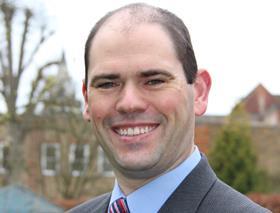Trainee, newly qualified and early career teachers ask the questions you daren’t, and our experts provide the answers. If you’ve got a question, email us
I am excited about my NQT year, but also anxious about not being prepared to teach. My ITT year was full on and, like many trainees, I spent hours planning my lessons. I have my timetable and am wondering how much should I prepare? I have bouts of panic when I think I haven’t meticulously planned my lessons and resources and added interleaving from previous lessons.
Pip Harrington, NQT

Harry Lord, head of year, answers: While spending lots of time creating lessons and thinking about the ‘how’ of a lesson is an invaluable part of teacher training, it is not feasible, sustainable, healthy or particularly enjoyable to spend such a long time creating resources. I have found using existing resources to be a much more effective use of my time and they are often to a much higher standard than any I would create.
You can find good quality chemistry resources on the RSC’s Education website. There are many other places to find good quality resources such as the Institute of Physics and the Best Evidence Science Teaching series. Just make sure you go through a few of the questions yourself first to make sure you’re confident before teaching in front of your class.
Someone much wiser than me once said ‘the whole is greater than the sum of its parts’ and it is important to lean on those more experienced than yourself in your department. Colleagues will have many resources and lessons that they will be happy to share with you (‘oven-ready’, if you will); you can simply adapt them to your style. Always remember that asking for help is a strength.
How do you stay safe in school teaching chemistry? Social distancing will be in place in my school, and there will be no practicals. I want to know what other safety measures teachersare taking in the classroom. Are schools going paperless? Are books still being used? How are you safely marking books?
Haroon Akhtar, NQT

David Paterson, chemistry teacher, answers: Staying safe is central to chemistry teachers’ thinking. We will need to take extra precautions for the foreseeable future to mitigate the additional hazards of Covid-19. Some changes will be whole-school. For example, we can’t take in exercise books. However, most schools now have experience of delivering resources electronically via online platforms. Assessment online is also becoming more commonplace. I’ve found Socrative very useful for formative assessment as I can assess and share students’ responses with the class. Microsoft Forms has been useful for summative assessment.
Practical work will remain important as part of a broad and balanced curriculum. I commonly use demonstrations before students carry out practical tasks to ensure they can see their way through the task. My lab visualiser (a Hue HD Pro camera) is excellent for allowing me to focus on the relevant manipulations or observations I need to draw the students’ attention to. Student practical work will be more limited given the requirements for quarantine of equipment between student ‘bubbles’. However, careful planning by departments with technicians should allow all teaching groups within a particular bubble to use the same equipment within a teaching cycle (week/fortnight). Microscale chemistry practicals will be particularly useful given the simplicity of the equipment and ease of storage and transport. CLEAPSS and SSERC offer useful guidance on practical work during Covid-19. Take a look at CLEAPSS microscale chemistry resources and SSERC microscale experiments and resources for more information.
What is there to look forward to in your first five to 10 years of science teaching?
Sonia Jina, NQT
Andy Chandler-Grevatt, senior lecturer in science education, answers: Within the first five years you have the opportunity to become the best science teacher you can: learning from colleagues, from your students and from your own experiences. Science teaching requires many skills and you can focus on developing your area of interest, for me it was classroom assessment. I became a key stage 3 coordinator in my third year, then an advanced skills teacher in my fifth, by my tenth I’d published science resources. My peers developed their own careers whether it was as head of department, a pastoral leader or becoming an examiner. There are so many opportunities.
Niki Kaiser, chemistry teacher, seconded to Education Endowment Foundation: Sometimes, you’ll leave a lesson feeling really low. Things don’t always go according to plan, students don’t always behave or understand in the ways you might have expected, or it might just snow, taking everyone’s focus far away from chemistry! But in other lessons, you’ll laugh really hard at things that are either intentionally or unintentionally funny, or smile as you observe lightbulb moments. Nothing equals the moment when a difficult concept finally clicks with a student, and this is particularly rewarding when you know they’ve struggled with it, and worked hard to understand. These moments will keep you going when things feel tough, as will the relationships you build with classes and with students. Sometimes the classes that are difficult to teach at first end up being the ones who most appreciate you, and who you will eventually really enjoy teaching. Don’t be afraid to let them know that you care about them, and want them to do well.
Two bits of advice I was given as an NQT that have served me well are: draw a line and start a clean slate at the start of each new lesson, and remember that sometimes you need to accept that lessons will be ‘good enough’, rather than ‘perfect’.

Kirsty Patterson, former chemistry teacher: You have professional relationships to look forward to. With the pupils, these are in a pastoral role as you get to know them as a form tutor, with colleagues these are friendships that will be strengthened by your shared experiences. Your colleagues will be a shoulder to cry on and will cry on your shoulder. They will be celebrating your successes and listening to your frustrations. They won’t let you leave without a smile on your face even after the toughest bottom set year 10 on a Friday afternoon. And sometimes they will bring cake. They will recognise your strengths, big you up and give you the confidence to try something new.
Matthew Bennett, education coach: In your first five years of science teaching, you’ll learn chemistry again. At university, studying science subjects doesn’t necessarily prepare you for teaching. In having to explain the subject to students of all abilities, you have to be able to explain things in detail and on different levels.
You’ll find yourself developing metaphors and models that work for you and your students. Read around the subject and use multiple sources to ensure you don’t just use the examples and models in the textbook. At first, you’ll feel deskilled, but you’ll learn so much more about how the world works in a way that can be explained to students. It’s a very rewarding experience.
Ben Geraghty, recently qualified teacher: As a chemistry teacher with QTS, the job market is yours. You fall into the category of being wanted and needed by a large number of schools, so it becomes very easy to choose something ideal for you and your situation.
When I first started teaching, I didn’t know how strong an attachment I would form with the pupils I taught. It brings a huge fulfilment to see students you teach thrive not just in your subject, but in other activities at school. Those professional relationships are career-defining and are one of the huge rewards that you get from this career.
You spend so much time with the staff at your school and the more you build those relationships, the better your overall career experience will be. The departments you work in become close like a family as you share experiences, positive or negative, and laugh it off together.
It sounds cheesy but the way you treat the pupils you teach will be remembered. By giving 100% to your job and building those relationships you will quickly build a legacy for yourself which leads to overall job fulfilment – and surely that’s the whole point of doing this.
Trainee or new teacher? Submit your teaching question to education@rsc.org with Classroom questions in the subject line. Unfortunately, we are unable to reply individually to each question.









No comments yet